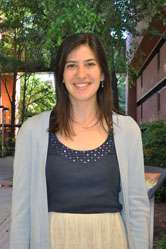Psychology
“The significance of family and psychological sense of community in the acculturation experience for Latin American first-generation immigrants”

Influxes of Latin American immigrant populations have changed the cultural and physical boundaries of communities within the United States. Accordingly, much psychological research in the context of community relationships experience explores migration to the United States. Two entities of support for Latino immigrants as they acculturate and adjust to the US are their family support networks and their psychological sense of community (PSOC) with regard to the Latin American/Hispanic population.
Using data from the qualitative semi-structured interviews of first-generation Latino immigrants conducted by team members of the Making Words Count lab and me, I am exploring the relationship between and significance of family and community for Latin American immigrants. In addition, my research will understand how psychological sense of community and family networks affect the nature of the first-generation immigrant acculturation experience, and reciprocally how the acculturation experience shapes Latin American families and their psychological sense of community.
How did you find your mentor for year research, scholarship, or artistic project?
I am a research assistant in the Making Words Count Lab. My research mentor is Dr. Anne Brodsky. I was really interested in her work on risk and resilience in Afghan communities. I read some of her published research and thought it was really interesting and innovative.
What project are you working on?
In December 2012, when I began working in the Making Words Count lab, our team was in the process of collecting interviews for our Community and Immigration study. We interview first- and second-generation Latin American immigrants and third-generation or more U.S. born citizens. Our research seeks to understand how these groups experience psychological sense of community, as well as to understand the acculturation practices of immigrants from Latin American countries. Our team has almost finished transcribing and checking our data now, so we’ve made great progress in the past year.
Do you get course credit for this work?
I have taken Honors 400, Psych 498, and I will be enrolled in Psych 499 in the spring.
What academic background did you have before you applied for the URA?
I worked for two different professors before I began in the Making Words Count lab. As well, I have taken many psychology classes, including two research methods courses. My English classes provided me with concise writing skills, which is important for the application.
Was the application difficult to do?
The application was not difficult, but thought-provoking. It was a great exercise in understanding the research methods I planned to use and what direction I wanted my ideas to take.
What has been the hardest part about your research?
I’m new to the field of community psychology and never had any training in qualitative methods, so that learning curve felt overwhelming at first. If possible, I’d recommend taking classes that are as close to your research methodology and subject area as possible before you begin to ease the process.
What was the most unexpected thing?
The amount of work that is put into doing “background” preparation for the actual data analysis and write-up is surprising.
What is your advice to other students about getting involved in research?
I would highly recommend getting involved in any and all research opportunities available. Research is an amazing way to both learn about an academic field as well as be a part of contributing to it. In addition, the people you meet through your research can become really great resources. My research mentor and the graduate students in our lab have both been amazingly helpful and supportive of my interests, and having them as role models and academic advisers has been one of my favorite parts of the research experience.
12/12/2013